- Home
- Belva Plain
Eden Burning Page 24
Eden Burning Read online
Page 24
“Not yet. We haven’t come to it in school, anyway.”
“Yes, and you may never come to it, the way the schools are. Read it for yourself.”
The old man was a nut about history. Again Will felt impatience, but because he liked the old man he wouldn’t show it.
“Yes, and then came the hard times for the estates. Debts, mortgages, and bankruptcies.”
“Served them right,” Will interrupted.
“My grandfather told me you could ride around and see great houses gone back to jungle with trees growing out of the rotting rooftops.” Clarence stopped abruptly. “You’re bored with all this, aren’t you?”
Will grinned.
“You may be only eleven, but that’s not too young to start understanding the past.”
“Why?” Will asked, arguing the question.
“Because that’s the only way to make the future better.”
“Have you made it any better?”
Clarence looked at him sternly. “Yes, I have. Listen here, my grandfather worked a full year on a sugar estate for wages of five pounds. He lived on the estate and paid rent for his house—-his hovel—and could be evicted at the owner’s pleasure. And you ask whether it’s better now? Yes, I’ll accept credit for my part in the labor movement that has made it better, although not nearly good enough, God knows.” He pulled on the oars and they creaked. “Now I’m too old. It’s in the hands of men like Nicholas Mebane and your father. They’ll push us still farther along. I’m glad your father left teaching. He can use his powers in larger ways.”
Something bursting in Will’s chest came out in a harsh voice, in harsh words. “He’s not my father! Why do you always call him that?”
“He is! He’s fathered you more than anyone else ever did! Sometimes you puzzle me, Will. You seem so critical, so sullen. But you’re much smarter than your age and I think by now you should be able to see yourself and see the people around you for what they are.” And letting up on the oars, he placed a hand on Will’s knee. “It hurts me to hear you shouting out ‘he’s not my father!’”
“All right, I’m sorry,” Will said.
“Then why do you keep doing it?”
“Look at him! And look at me!”
“The color, you mean? That bothers you? Why? Do you think you’re pure African or I am? It’s only a matter of degree. Listen, it took years to work out the resentments between the browns and the blacks. The browns had the good jobs, the money, and the vote. You know when they started to get together and work together? After the blacks got ahead a little bit and sweated themselves enough to buy a scrap of land, why then they got the vote, too, and the browns wanted their votes to get elected to the legislature. So,” and here Clarence, laughing, leaned back while the boat drifted toward shore, “well, a black man, knowing that, would simply not pay his taxes; so he wouldn’t be able to vote, and then one of these upper-class light skins would pay his taxes for him in exchange for his vote! Clever, wasn’t it?” he cried, wearing a frisky expression.
Will was not amused. “Tricks. That’s all it still is. Tricks, instead of having their rights. He and Mr. Mebane, hanging around Mr. Luther, up there in that fancy house! ‘Eleuthera means free,’ he tells me every time we go there. Free for who? Not for people like us! You think we’ll ever live in a place like that? He gives you a cold drink and a piece of cake and thinks he’s so grand.”
“Who does? Francis Luther? It happens you’ve picked on one of the most decent men on the island.”
“I heard you say once you didn’t trust him.”
“I didn’t mean it that way, exactly. I was being wary. Give him a chance to prove he means what he says, that’s what I meant. And so far he has. He’s built houses, he’s opened a dispensary with a nurse on his place, and a doctor comes out once a month for checkups. Nobody else has done what he’s been doing. A very decent man,” Clarence repeated firmly.
Will snickered, remembering something. “He shacks up with Mrs. Tarbox in town.”
“What! What kind of talk is that? Where’d you hear a thing like that?”
“I heard Désirée talking to Pat—to Dad—in the kitchen. He said it wasn’t true, but she said people see him at her house.”
“People get me sick! Nothing better to do but spread lies and dirty gossip. I’m surprised at Désirée. And don’t you repeat it, hear?”
“Well, all right.” The old man was really angry, you could see that. “Well, all right. But still, Uncle Clarence, everything you said, sure it’s okay that he has a nurse there and all that stuff, but still—”
“Still what?”
“Still it’s only crumbs, isn’t it? Like the kids diving for money in the harbor when white tourists come. They think they’re so kind, throwing money away. The other day in town a man and woman, American, I think, by the way they talked, they stopped me on the street and handed me some candy. I threw it on the ground and told them what they could do with it.”
“Will, Will, that was mean! You shouldn’t have done it. The people meant well, they meant to be kind. Don’t you see that?”
The crinkled face was distressed, its lines reaching up to where the white hair receded from the temples like cotton tufts. He’s old, Will thought. Too old.
“No, I don’t understand you, Will. It’s hard to remember what I was like when I was your age. But I don’t believe I was like you. No, I wasn’t. You’re a very bright boy, much more than I was. You don’t study hard enough, though. Sometimes”—Clarence spoke slyly—“I catch you sitting over your books, just sitting there looking at nothing. What are you thinking of?”
“I’m thinking that you people don’t do anything! You sit and talk about committees and elections and independence coming and how you can hardly make ends meet and shoes are so expensive. But in the Da Cunha shop they’re selling wine from France and diamonds worth more than your whole house. Talk, talk!”
“What would you have us do?”
“Get out in the streets! Get out and shoot! Burn their houses down and take what you need. That’s what.”
“That sort of thing gets nowhere! It’s not civilized. One works through government, through the labor unions! Ah, well, you’re a child. Come, here we are, let’s get rid of this fish and go home.”
A small crowd awaited the catch on the beach, where an impromptu fair and barter had been set up. Homemade brooms and hats and baskets, baked goods and flowered cotton aprons were set up on improvised tables and upended boxes. Will took the net of gleaming fish and laid it in a box while Clarence fastened the boat.
“Better not let anybody hear you talk about burning houses, son,” he warned, as he tied up.
Will stood there watching the old man fuss with the rope. Fumble. Fumble. Fumble your life away. He felt a strange softness toward the old man. He wanted to reach out and stroke him on the shoulder. Then anger filled him again, and he did not.
FOURTEEN
One day Teresa Luther went back to St. Felice. Tee Francis resisted still, but Teresa Luther gave in at last.
“How can you refuse?” Richard urged. “He’s asked us so many times, and now, with our first grandchild coming—”
“I have responsibilities,” she began.
“Nonsense! You have grown daughters who’ll look after Margaret. They’ll all get along without you very well for a few weeks,” he said gently.
Adversity had softened and weakened him. Oddly enough, she often thought, it had given him a greater dignity, as well.
“Look,” he said. “I got out this old album. Here you are.”
There she was, serious and pale under the dark fall of her hair. Here they all were, Père with his gold-knobbed cane on the lawn at Eleuthera and Julia, in flounces, standing with Tee in front of the twin staircase at Drummond Hall.
“That must have been taken not more than a year or so before we were married,” Richard observed.
“It must have been.”
He said unselfishly, “Fr
ancis would be so glad! I can see his face when you walk in.”
“And when you walk in.”
The album rested on the windowsill. A flurry of dead leaves, driven in gray, chilled air, blew past.
“It’s too bad we had to be so gray and gloomy on your first day in Paris,” Anatole Da Cunha had said on just such a day.
“You’re a strong girl, stronger than you know.” That was Marcelle, who had taught her to survive.
Strange, I haven’t thought of her in years. Not strange, I have made every effort not to.
“You can do whatever you have to do,” Marcelle had said.
That was true. A marriage without love, a secret like a box of dynamite in the closet—one could manage anything if one had to. Now, finally, I am called upon to go back. There can be no excuse this time, I have run out of them.
“Then you’ll go?” asked Richard. “I can make arrangements?”
“Yes, I’ll go,” Teresa Luther said.
It was not very much changed. The public market, the cathedral close, the soft-drink stalls and the dusky, gray-green tamarinds were all the same. Raucous radios, more cars and horns, and a storefront movie advertising a cowboy picture, these were different.
And the house was different. They had built a new wing, with guest rooms and a nursery for the coming baby. Marjorie had renewed the house with a fitting and patrician charm that, in a way, resembled herself. It’s not what it was when I lived in it, Tee thought, remembering crumbled plaster.
And she told her daughter-in-law, “It looks like you.”
Marjorie was pleased with the comment. “Not, I hope, the way I look now,” she said, touching her enormous belly, and pleased, Tee saw, with that, too.
Francis wanted them to tour outdoors with him. He walked ahead with his father, Tee following, up the slopes toward the banana groves.
“This is the major source of income,” he explained. “Green gold, Father.”
Richard was fascinated. He had never been in any part of the world like this one.
“The original tree is called the mother. New trunks grow out of the old roots. See this bunch? We call it a stem. See these? We call them hands. You get anywhere from seven to twelve hands in a cluster. The bananas are called fingers. You get over a hundred fingers to a stem.”
The two men, framed by shaggy leafage, paused on the path, the one still wearing his dark city suit, the other in workman’s khaki. Francis’ hair had lightened and his skin been darkened in the sun; he shone. She wondered what Père would have thought about this young man of his blood. And with that extreme perceptiveness of him which she had always had, she recognized that something new, something vibrant and exciting, had come alive in him.
Richard, interested in finance, wanted to know how the crop was marketed.
“Well, Dad, I have to tell you I’m rather proud of something I’ve been able to do. We used to work on contract, you know, anywhere from one to five years with a big company; you’d give them a weekly estimate of what you’d deliver. Every planter, large or small, was on his own. But now we’ve got a cooperative. I had a hard time convincing people it would be a good thing, but now they admit it is, and we market through the cooperative, which gives us much greater bargaining power, naturally. Also, we help out in other ways, making loans for fertilizers, and disease control, and—there’s a lot more to it, but that’s the general idea, anyway.”
Tee paused, letting the two men climb. Above, where the banana groves stopped and the jungle look over, one could see light playing in the upper branches of the dense acomas. Cathedral light, although one might very well put it the other way, remembering forest shadows in old churches at the place where the apse meets the nave. Mounting farther up the Morne, you would come to where the light, shafting straight as rulers, struck the ground and sifted up again into a mist, knee-deep. Yesterday. Yesterday.
And in the morning of childhood, yellowbirds with legs like two thin twigs came to the sugar bowl on the veranda. Each dark-gray wing bore a white mark, a beauty spot, she used to say. The afternoon drowsed in cicada hum until, at four, the rain came, leaving its sharp and bitter fragrance on the air….
Returning, Richard and Francis roused her into the present moment and they walked back to the house. Humped Brahman cattle, grazing behind rail fences, raised their cream-colored faces toward the sound of voices, questioning with dark, languid eyes.
“First prize at the agricultural show,” Francis said proudly. “Bananas are only what keep me solvent, you know. All the rest is what I really care about. I’m diversfying, trying to raise the island by its bootstraps. Lionel thinks I’m a fool to take risks and care so much. He’ll probably tell you so. But he believes just in looking out for number one.”
“There’s something to be said for looking out for number one,” Richard observed.
When Francis did not answer, Tee asked, “Don’t you get along with Lionel?”
“We get along all right. Marjorie likes him more than I do, though. They think alike. He’ll be here tonight at dinner.”
“Marjorie said something in her last letter about Lionel’s divorce. She didn’t say why, just said it was ‘civilized.’ What sort of person is his wife? I mean, what was the reason?”
Francis looked away. “I don’t know, really. A marriage fails: it comes down to that, whether there’s one reason or a thousand, doesn’t it? It failed.” He stopped abruptly, then resumed, “I’m worried about Marjorie. The doctor says her pressure’s too high. They may have to take the baby if it doesn’t come soon by itself.” He turned a troubled face toward his parents. “I’m glad you’re here.”
“We’ll do anything we can, you know that,” Richard said.
“And there’s something else. A damned mess, just when you’ve come for your first visit! There’s talk of a strike, a general strike. It could paralyze us. It could get very nasty.” He squinted thoughtfully into the sun. “Still, maybe not. And I really don’t think—in fact I’m sure they won’t bother me personally. I’ve done so much and they know it. I’ve been on labor’s side since the day I got here. No, I’m sure they won’t bother me.”
In the dining room, Richard sat opposite Anatole Da Cunha’s painting of Morne Bleue.
“I have to admit it hurt to part with it,” he said, “but it belongs here without question. Oh, he has the touch, hasn’t he? Marvelous, marvelous! You can feel the sun on your skin! You know, I’m disgusted with some of the things the art critics write these days. Such as last week: ‘A face representing a civilization in decline.’ Now what the devil does that mean? Fuzzy personal impressions masquerading as analysis! When all that matters is whether you can feel the sun on your skin.”
Marjorie got to the point. “It must be worth a good deal, mustn’t it, now that Da Cunha’s so old?”
“Oh, definitely. And when he’s dead, the value will really shoot up. You know, Teresa, I should have had him paint you when we were in Paris. I wasn’t thinking.”
The mirror over the sideboard reflected Tee’s face, very white in candlelight and dusk, a face still without lines, still sweetly curved, and yet not young anymore.
“Let’s see,” Lionel remarked, “you were fifteen, weren’t you, when you left? So I must have been not quite three. Yet I always thought I remembered you, I suppose because Mother talked about you so much.” He laughed. “You were a wild girl, she always said.”
“I? Wild?”
“Oh, she only meant bareback riding and running around with animals—dogs and colts and parrots—all the things she never did, I suppose.”
“Parrots!” As always, Richard was enthusiastic over anything new. “You have them wild here, don’t you?”
“They nest way up the Morne toward the rain forest, and you don’t always get to see them, but with luck we might. I’ve even seen the imperial parrot a couple of times. Sisseron. Amethyst and emerald, a glorious bird. If you’re willing to climb,” Francis offered, “we can go one morning.”
/>
“Oh, I’m willing!” Richard cried.
Tee thought, I should not have come. Her mouth went dry and she laid the fork down, then picked it up again and took some food, something without taste.
He could not possibly be here, could he? Patrick Courzon? The name made a sharp impact on her ear. And even if he were, she would never encounter him! The island was small, but not that small. And so stratified by color and caste into concentric circles which didn’t touch. Surely, though, he was not even here! He would have stayed in England, or gone somewhere else to use his fine education. Not here.
But suppose he were? She tried to picture him: a year older than Francis, half of his blood, of her own blood, each of them alive and breathing at this very instant—now!—on this high, blue day; alike, so alike they must be, by the very law of averages! And still so different.
A maid poured wine for Francis, her thin, pretty arm, red-brown, dusky, stretched parallel to his pale one, making exactly the contrast that that other boy’s would make, one supposed, if ever they should—Impossible! And yet, as fear trembled in Teresa for the thousandth time or more, something else trembled in her, too: pity, profound pity.
The young maid moved about the table, pouring the wine. There was proud grace in the poise of her narrow head; substitute for the blue cotton uniform a sweeping ballgown and you would have a princess, a dark princess. The girl, meeting Tee’s gaze, smiled slightly.
Crazy world, with its strictures and classifications; all those gradations of mankind based on color and money, on legitimacy and class, when all we are is only—what? Protein, minerals, and water, mostly. Sea water. Yes, it’s absurd, all of it, and still I haven’t the courage to challenge it, or even to face it. If I could know what he is like, just quietly, secretly know, without anyone else’s knowing, without ruining everything, facing rage. Sometimes I think I’ve been brave, but not brave enough. Sometimes I think I died here in this house when I was fifteen, and everything since has been a dream.
There came over her then an engulfing sense of unreality, of time so telescoped that the far past was only yesterday, and yet so long ago that it might never have happened. She gripped the edge of the table.

 The Golden Cup
The Golden Cup Her Father's House
Her Father's House Whispers
Whispers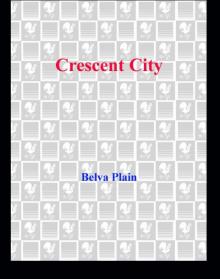 Crescent City
Crescent City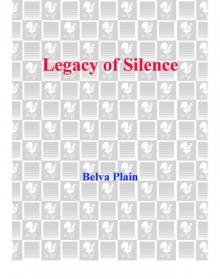 Legacy of Silence
Legacy of Silence Crossroads
Crossroads Promises
Promises After the Fire
After the Fire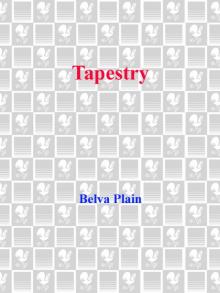 Tapestry
Tapestry Looking Back
Looking Back Heartwood
Heartwood The Carousel
The Carousel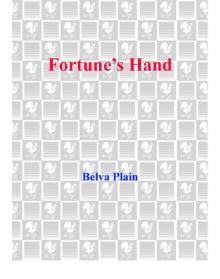 Fortune's Hand
Fortune's Hand Homecoming
Homecoming Random Winds
Random Winds Harvest
Harvest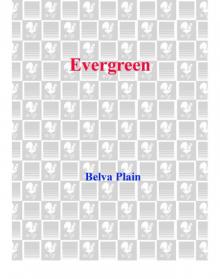 Evergreen
Evergreen Treasures
Treasures The Sight of the Stars
The Sight of the Stars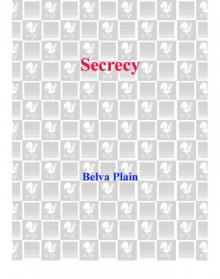 Secrecy
Secrecy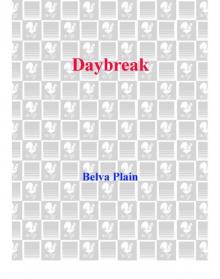 Daybreak
Daybreak Eden Burning
Eden Burning